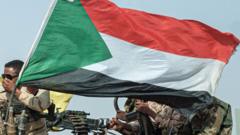Will She Escape the War Zone Before Giving Birth? A Pregnant Woman's Diary

Published: 2025-08-27 23:49:10 | Category: technology
Amira's journey through a war-torn Sudan highlights the harrowing experiences faced by civilians amid conflict, particularly pregnant women in desperate situations. Forced to flee her home in En Nahud due to escalating violence between the Sudanese military and the Rapid Support Forces (RSF), she documented her perilous escape as she sought safety for herself and her unborn child.
Last updated: 04 October 2023 (BST)
Key Takeaways
- Amira fled En Nahud, a city seized by the RSF, while seven months pregnant.
- Travel in Sudan has become perilous, with armed groups controlling transport and imposing exorbitant fees.
- The conflict has resulted in widespread humanitarian crises, with civilians caught in the crossfire.
- Amira recorded her experiences in an audio diary, revealing the horrors of her journey.
- Despite reaching safety in Uganda, she remains anxious about family left behind in Sudan.
The Context of the Conflict in Sudan
Sudan has been embroiled in a civil war for over two years, primarily between the Sudanese Armed Forces (SAF) and the RSF. The RSF, a paramilitary group with roots in the Janjaweed militias of the Darfur conflict, has been accused of numerous human rights violations during the ongoing violence. As these two factions vie for power, the civilian population has become increasingly vulnerable, with reports of extrajudicial killings, ethnic targeting, and widespread displacement.
Amira's Harrowing Escape
Amira's journey began in May when the RSF seized control of her city, En Nahud. Faced with the imminent danger of remaining in a city devoid of medical facilities, she felt compelled to flee. With no hospitals or pharmacies available, her pregnancy added urgency to her decision. "There were no hospitals anymore, no pharmacies," she recounted. "I was afraid if I stayed longer, I wouldn't find any vehicles heading out."
The Risks of Travel in a War Zone
Traveling through conflict zones poses significant risks, and Amira's experience was no exception. She and her husband boarded a truck, but tensions escalated when an RSF driver attempted to extract additional payments from passengers. "The driver immediately pulled out his gun and threatened to shoot," Amira described, illustrating the volatile environment. This incident underscored the pervasive fear among civilians as they navigated a landscape rife with armed conflict.
Life on the Road
The journey to safety was fraught with challenges. Overloaded with passengers and luggage, the truck traversed treacherous roads filled with potholes and streams. Amira's anxiety was palpable. "I was scared the entire time," she said, praying that her baby would remain safe throughout the arduous trip.
Obstacles Along the Way
After reaching el-Fula, Amira's fears only intensified as she recognised that the military was approaching. The army's reputation for targeting certain ethnic groups, including the Baggara and Rizeigat, added to her anxiety. "I didn't know what would happen if the army reached el-Fula," she recorded, highlighting the risks faced by civilians based on their ethnic backgrounds.
Humanitarian Crisis and Violence
The conflict in Kordofan, a region rich in oil resources and vital transport routes, has spiralled into a severe humanitarian crisis exacerbated by the presence of multiple armed groups. The UN has reported on the dire conditions, which have made it nearly impossible for aid organisations to provide necessary assistance. The RSF, in particular, has been accused of exacerbating the violence, while the military has condemned "individual" violations without taking responsibility for broader systemic issues.
Navigating Checkpoints and Bribes
As Amira continued her journey, she encountered numerous RSF checkpoints where armed guards demanded bribes. "The RSF drivers were working according to their mood,” she noted, illustrating the arbitrary nature of travel under such conditions. The situation was compounded by scarce resources, with food prices skyrocketing and water being nearly impossible to find.
Moments of Despair
During her journey, Amira faced moments of despair, particularly when her vehicle broke down in an isolated area. Stranded without water and feeling hopeless, she lay down on the ground, contemplating her fate. "I swear to God, I felt that I might never reach another place again, that I would die right there," she admitted, encapsulating the emotional toll exacted by her treacherous journey.
Finding a Way to Safety
Despite the numerous obstacles, Amira and her husband eventually found a way to escape, catching a ride on a pick-up truck. After navigating through difficult weather conditions and muddy roads, they reached Juba, South Sudan, where they were able to take a bus to Uganda. The journey of approximately 1,300 km (810 miles) was arduous, but it marked a significant step towards safety.
Bittersweet Relief and Future Uncertainty
Now in Uganda, Amira's relief is tinged with anxiety. As she prepares for childbirth, she reflects on the family members she left behind in Sudan. "I'm very afraid of the feeling of giving birth, because this is my first time," she expressed, revealing the overwhelming emotions that accompany her new circumstances. The absence of her mother during this pivotal moment adds to her stress.
Activism Amidst Conflict
Before the war escalated, Amira was an active participant in women’s rights and pro-democracy movements. She engaged in relief work through Emergency Response Rooms but faced suspicion from both the military and the RSF. "I was afraid of the army and military intelligence," she recounted, highlighting the pervasive fear that characterised daily life in Sudan.
The Reality of Dual Threats
Amira's experiences reflect the broader reality for many Sudanese civilians, who find themselves caught between two oppressive forces. Both the military and the RSF have been accused of human rights abuses, including looting and violence against civilians. In Amira's words, "They do no less than what the army does. They are all the same." This sentiment captures the despair felt by many who have endured the brutality of both sides.
Hope for the Future
As Amira contemplates her future as a mother, she holds onto hope that conditions in Sudan will improve. "I hope that Sudan's situation will improve," she stated. Despite acknowledging that the country would never return to its former state, she expressed a desire for security and an end to the violence. "People won't just die randomly, like they are now," she concluded, reflecting both her resilience and her longing for peace.
Amira's story serves as a poignant reminder of the human cost of conflict and the strength of those who endure unimaginable hardships. As her journey unfolds, it raises critical questions about the ongoing violence in Sudan and the prospects for a safer future for its citizens. #SudanConflict #HumanRights #RefugeeJourney
FAQs
What is the current situation in Sudan?
The conflict in Sudan involves ongoing violence between the Sudanese military and the Rapid Support Forces (RSF), resulting in a humanitarian crisis impacting civilians significantly.
What challenges do civilians face when fleeing conflict zones?
Civilians like Amira face numerous challenges when fleeing conflict zones, including armed checkpoints, high travel costs, scarce resources, and the constant threat of violence.
How has the RSF impacted the humanitarian crisis in Sudan?
The RSF has been implicated in numerous human rights violations, exacerbating the humanitarian crisis by obstructing aid efforts and perpetrating violence against civilians.
What are the ethnic tensions in Sudan's conflict?
Ethnic tensions play a significant role in the conflict, with certain groups being targeted based on their perceived affiliations with armed factions, leading to widespread fear and violence.
What can be done to improve the situation in Sudan?
Improving the situation in Sudan requires international attention, humanitarian aid, and efforts to foster dialogue and peacebuilding among conflicting parties.



